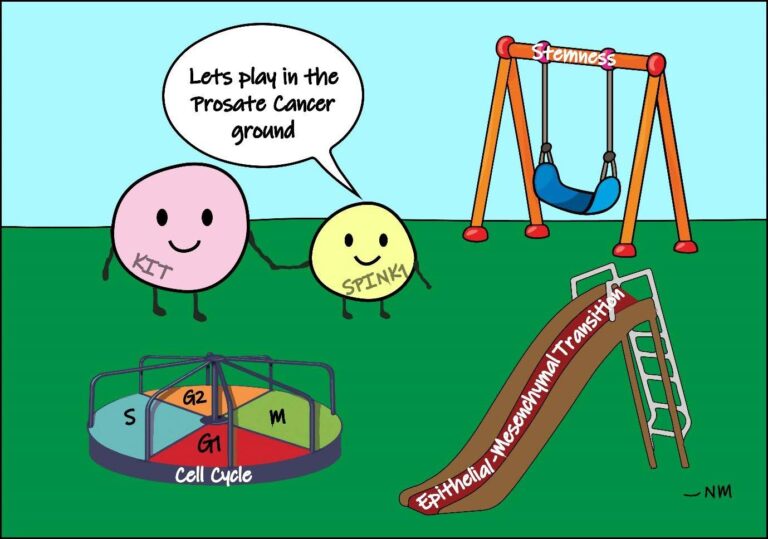KIT as a novel therapeutic target for prostate cancer
Work done in the lab of Prof. Bushra Ateeq at the Indian Institute of Technology Kanpur and was supported by the National Bioscience Award for Career Development and the DBT/ Wellcome Trust India Alliance grant.
Dr. Nishat Manzar is a Postdoctoral Fellow specializing in prostate cancer research at Dana-Farber Cancer Institute, Boston. She did her PhD in Molecular Oncology from the Indian Institute of Technology Kanpur under the guidance of Prof. Bushra Ateeq. During her doctoral research, she explored the transcriptional circuitry associated with SPINK1 upregulation in prostate cancer, mainly focusing on its plausible significance in advanced-stage disease. She revealed a compelling association between SPINK1 and the neuroendocrine phenotype, showcasing that androgen deprivation therapy induces SPINK1 upregulation and neuroendocrine features. During her PhD, she received several international and national recognitions for her exceptional research contributions. In her current role, her research is focused on unraveling the pivotal molecular players and mechanisms that drive prostate cancer metastases. Her unwavering passion for advancing the understanding of cancer fuels her commitment to pioneering research, with the ultimate objective of making a tangible difference in the lives of those affected by this challenging disease.
Author Interview
How would you explain your research outcomes to the non-scientific community?
Prostate cancer develops when normal cells become abnormal and grow abruptly in the prostate gland. Although not all abnormal growths are cancerous (malignant), some may be benign and do not spread to other body parts. Prostate cancer stands as the most diagnosed malignancy among men globally. At the molecular level, prostate cancer is a heterogeneous disease, with distinct genomic alterations driving its progression. Our research was focused on a specific molecular subtype called SPINK1-positive prostate cancer, characterized by elevated SPINK1 levels, known for its aggressivity and poor response to standard therapies. To address this challenge, I aimed to identify alternative treatment approaches for SPINK1-positive prostate cancer. We employed advanced proteomic tools to explore the active signaling pathways in SPINK1-positive cancer and found that KIT tyrosine kinase signaling was notably active. We corroborated these findings in clinical specimens obtained from prostate cancer patients and confirmed a positive association between SPINK1 and KIT levels.
Recognizing the potential of targeting KIT signaling, a pathway implicated in various cancer types and “druggable” using FDA-approved drugs, we investigated the effects of Pexidartinib, a KIT inhibitor, on SPINK1-positive prostate cancer. Interestingly, SPINK1-positive prostate cancer cells treated with this inhibitor showed a remarkable reduction in SPINK1-associated oncogenic characteristics, such as cancer cell proliferation and stemness. In addition, the inhibition of KIT signaling resulted in cellular reprogramming, as marked by the decrease in the expression of markers related to the WNT pathway. Expanding our study beyond cell-based experiments, we investigated the impact of administering KIT inhibitors in the immunodeficient mice bearing SPINK1-positive tumors. The outcomes were noteworthy, revealing a substantial decrease in tumor growth and metastases compared to the control group. Moreover, the KIT inhibitor-treated group showed a striking difference in bone density and other bone morphometric parameters, highlighting the role of KIT signaling in bone lesions. Altogether, our study provides compelling evidence supporting the therapeutic targeting of the KIT tyrosine kinase receptor in advanced-stage prostate cancer, especially in cases with bone metastases.

“Study emphasizes the potential of targeting KIT signaling as an alternate therapeutic approach for the management of advanced-stage prostate cancer.”
How do these findings contribute to your research area?
In the realm of prostate cancer research, resistance to anti-androgen therapy is a growing concern, often leading to tumor relapse and limited treatment options for advanced-stage disease. Our study emphasizes the potential of targeting KIT signaling as an alternate therapeutic approach for the management of advanced-stage prostate cancer.
What was the exciting moment during your research?
The exciting moment of our study came when we observed an intriguing phenomenon. Our earlier study discovered that the androgen receptor (AR) mediated the transcriptional repression of SPINK1, thus highlighting that anti-androgen drugs could be detrimental for prostate cancer patients, and a well-informed decision by weighing risk and benefits should be made (Nature Communications, 2020). Building on this, we found that inhibiting KIT signaling could restore the AR protein, which eventually downregulates the expression of SPINK1, forming a feedback loop.
What do you hope to do next?
The prospects of this study are centred around advancing to clinical trials aimed at evaluating the effectiveness of the KIT inhibitor in patients with advanced-stage prostate cancer. If successful, these trials could pave the way for the use of KIT inhibitors as a new and promising treatment avenue for advanced-stage prostate cancer.
Where do you seek scientific inspiration from?
My scientific inspiration emanates from nature for its unparalleled precision and intricate complexity, where every detail is finely tuned at both the micro and macro levels. This simple yet profound regulation fuels my passion to seek a better understanding of cellular complexity and its intricate circuitry.
How do you intend to help Indian science improve?
I believe that the future of Indian science lies in nurturing and guiding young researchers. I intend to offer mentorship and career counselling to empower young minds and help them spread their wings in the right direction.
Reference: Manzar, N., Khan, U. K., Goel, A., Carskadon, S., Gupta, N., Palanisamy, N., & Ateeq, B. (2024). An integrative proteomics approach identifies tyrosine kinase KIT as a therapeutic target for SPINK1-positive prostate cancer. iScience, 108794. https://www.sciencedirect.com/science/article/pii/S2589004224000154
Biopatrika: Bringing Science to Society
© Biopatrika 2024 All Rights Reserved.
